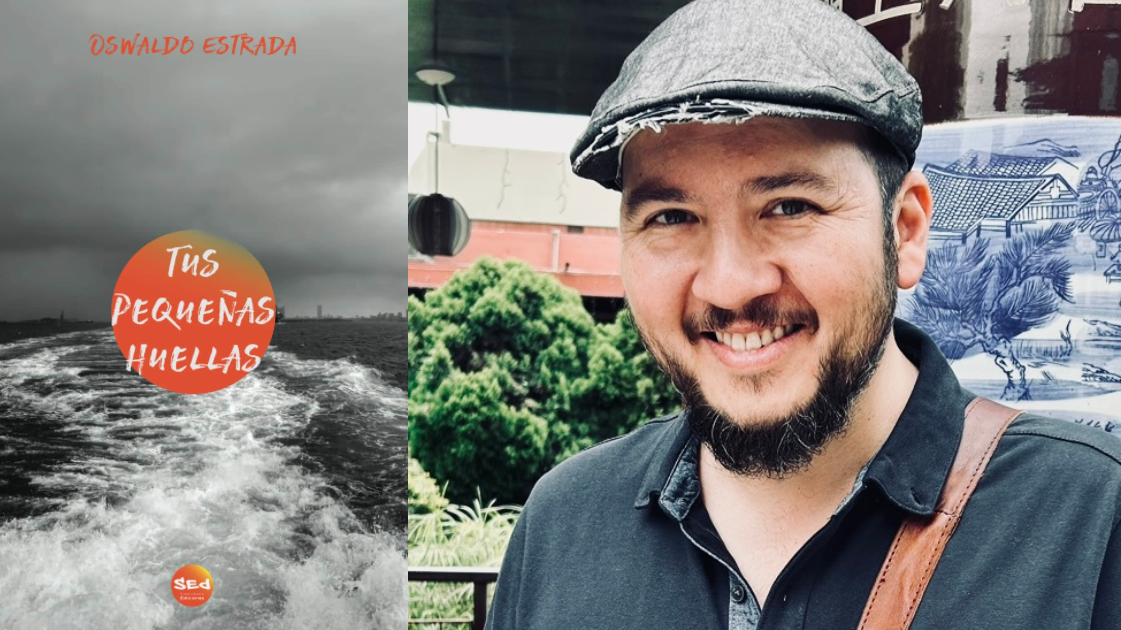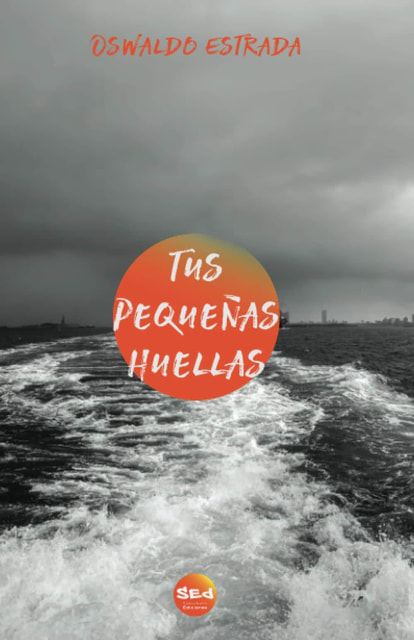Tus pequeñas huellas
Oswaldo Estrada
|
What does it mean to be a migrant today, when migration can be considered a continuum that runs through our lives and is no longer represented by phenomena delimited in space and time? How do we survive uncertainty, without shelter, without a user manual? These are some of the questions that we find in Tus pequeñas huellas (Suburbano Ediciones, 2023), the first novel by Oswaldo Estrada. Undoubtedly, we have here a work of great aesthetic quality that marks a radical change in the production of this Peruvian author, who until now had worked on migration, the construction and reconstruction of the many identities that derive from it, within the realm of the short story, with collections that have received important awards. In Tus pequeñas huellas we find the story of Marena and Andrés, two Peruvian immigrants who live in New York. She is a journalist, and he works as an editor for the publishing industry. Like many of the characters that Estrada has created in previous works, both face the challenge of telling what it means to be an immigrant and live in a constant negotiation of one’s own identity. As foreigners, Marena and Andrés share the difficulty of finding their way in American society, so full of internal contradictions and historical legacies, such as racism and classism. In this complex context, the couple builds their life and their identity in constant movement, facing, like Andrés, the most difficult challenge about this condition: the awareness that you never belong, “even after spending your entire life in this country, speaking their language, eating their food. He will always be a stranger” (145). |
Tus pequeñas huellas addresses these questions throughout thirteen chapters in which the author intertwines various points of view that make visible the contradictions in the search for an “emergency exit,” an illuminating image that often appears in Estrada’s narratives. Thanks to the confrontation of the points of view of Andrés and Marena, the chapters are presented as segments of the journey that the protagonists travel to face loss, nostalgia, and the desire for a different life.
The novel not only recounts the efforts of these two immigrants in New York, but also delves into the way in which they handle the equally complex feeling of nostalgia for their native Peru. What do we remember about our country of origin when we are no longer there? In the novel, Marena and Andrés move both physically and emotionally from the US to Peru and vice versa, trying to find a link between the memory of a violent Peru, from which they managed to escape, and the nostalgia for a country that may have never been there: “Remember that I left in the midst of violence and at that time the least we thought about was tourism” (150), Andrés tells Marena during a trip, adding a few pages later: “I think about everything we left behind. The day we left. About what it would have been like to stay in Lima” (189). Thanks to these words the novel recreates a clash of emotions always present in every immigrant.
Against this backdrop of migration, the text develops another delicate topic: the difficulty of having children. While trying to find a place of their own in a foreign land, the protagonists suffer the premature loss of two children, Alma and Diego. If there are many works that face the challenges of being a mother and father, the painful impossibility of parenthood is almost never handled. Making this other side of motherhood and fatherhood visible is a difficult but urgent task, especially if we think that infertility continues to be a taboo in our societies, for it makes us feel uncomfortable and guilty, even if it is not our fault. The strength of Tus pequeñas huellas lies in giving us back not only the footprints that remain embedded in the body of Marena and the other women who populate the story, due to the premature loss of a child or a biochemical pregnancy, but in the profound development of the point of view of the parents, whose pain in these long mourning processes is almost always silenced.
In Tus pequeñas huellas, Oswaldo Estrada uses a painful and at the same time empathetic vocabulary, which might help those who find themselves in the same situation as Marena and Andrés to put this deep and dark pain into words. And for those who have never experienced this, at least the reading of this novel can familiarize them with these silent, solitary losses associated with motherhood and fatherhood. Due to its treatment of these themes, the text also offers a deeply political discussion, which moves from grief to condolence, especially because the author dialogues a lot with other authors, proving that all writing is only possible as part of a community.
Tus pequeñas huellas is a novel, of course, but it is also a gesture that gives us the possibility of facing, with a sigh of relief, our life shared with others, in migration, on the long journey to becoming parents or simply in the daily attempt to find or lose ourselves permanently.
Oswaldo Estrada (1976) has published the short story collections Luces de emergencia (2019), Las locas ilusiones y otros relatos de migration (2020) and Las guerras perdidas (2021). He is the editor of Incurables. Relatos de dolencias y males (2020). He has received several medals from the International Latino Book Awards and the First Prize for Testimony from the International Latino and Latin American Book Fair at Tufts 2020.
Tus pequeñas huellas (2023) has been published by Suburbano.
The novel not only recounts the efforts of these two immigrants in New York, but also delves into the way in which they handle the equally complex feeling of nostalgia for their native Peru. What do we remember about our country of origin when we are no longer there? In the novel, Marena and Andrés move both physically and emotionally from the US to Peru and vice versa, trying to find a link between the memory of a violent Peru, from which they managed to escape, and the nostalgia for a country that may have never been there: “Remember that I left in the midst of violence and at that time the least we thought about was tourism” (150), Andrés tells Marena during a trip, adding a few pages later: “I think about everything we left behind. The day we left. About what it would have been like to stay in Lima” (189). Thanks to these words the novel recreates a clash of emotions always present in every immigrant.
Against this backdrop of migration, the text develops another delicate topic: the difficulty of having children. While trying to find a place of their own in a foreign land, the protagonists suffer the premature loss of two children, Alma and Diego. If there are many works that face the challenges of being a mother and father, the painful impossibility of parenthood is almost never handled. Making this other side of motherhood and fatherhood visible is a difficult but urgent task, especially if we think that infertility continues to be a taboo in our societies, for it makes us feel uncomfortable and guilty, even if it is not our fault. The strength of Tus pequeñas huellas lies in giving us back not only the footprints that remain embedded in the body of Marena and the other women who populate the story, due to the premature loss of a child or a biochemical pregnancy, but in the profound development of the point of view of the parents, whose pain in these long mourning processes is almost always silenced.
In Tus pequeñas huellas, Oswaldo Estrada uses a painful and at the same time empathetic vocabulary, which might help those who find themselves in the same situation as Marena and Andrés to put this deep and dark pain into words. And for those who have never experienced this, at least the reading of this novel can familiarize them with these silent, solitary losses associated with motherhood and fatherhood. Due to its treatment of these themes, the text also offers a deeply political discussion, which moves from grief to condolence, especially because the author dialogues a lot with other authors, proving that all writing is only possible as part of a community.
Tus pequeñas huellas is a novel, of course, but it is also a gesture that gives us the possibility of facing, with a sigh of relief, our life shared with others, in migration, on the long journey to becoming parents or simply in the daily attempt to find or lose ourselves permanently.
Oswaldo Estrada (1976) has published the short story collections Luces de emergencia (2019), Las locas ilusiones y otros relatos de migration (2020) and Las guerras perdidas (2021). He is the editor of Incurables. Relatos de dolencias y males (2020). He has received several medals from the International Latino Book Awards and the First Prize for Testimony from the International Latino and Latin American Book Fair at Tufts 2020.
Tus pequeñas huellas (2023) has been published by Suburbano.
Comment Box is loading comments...
|
|









